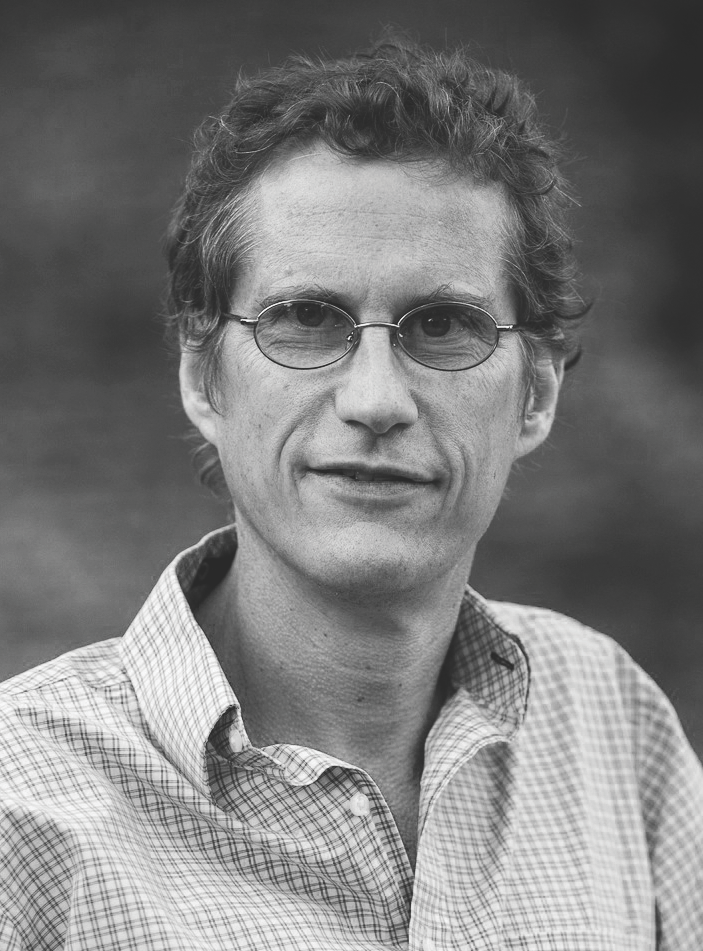James McLaughlin’s Bearskin is a venture into the dark heart of Appalachia.

To say that James McLaughlin, “Jimbo” to his friends, worked long and hard on his novel Bearskin, published last summer by the Ecco imprint of HarperCollins to rave reviews and with a recent screen deal, is almost as much of an understatement as saying that McLaughlin likes the mountains. The book was 30 years, two careers, and a second graduate degree in the making—and even then his editor had some issues. “What’s all this Rice running around in a scat-encrusted ghillie suit?” the editor asked him on reading the manuscript. “Can we cut that?” The scene is part of a wild, dreamlike descent into an Appalachian heart of darkness and the answer was—fortunately for the reader—“No.”
A rangy 55-year-old land-conservation expert who earned a law degree and an MFA in writing at UVA after graduating from Washington & Lee, McLaughlin now lives with his wife, Nancy, a professor at the University of Utah Law School; their 150-pound Pyrenean mastiffs, Odin and Little Bear; and a pair of cats in Emigration Canyon, high above Salt Lake City. Here, he often sits on their deck, looking out at the Wasatch Range and keeping a keen eye out for the moose, mule deer, wildcats, and goshawks that frequent the area. (When he failed to let his dogs out one night, a coyote snatched one of their cats.)
But Bearskin—the fictional story of protagonist Rice Moore’s defense of a private land reserve from bear poachers, while being himself hunted by a Mexican drug cartel killer—is not set in the Rockies, but in Appalachia, where McLaughlin grew up. The family’s farm, 330 acres at the base of Jump Mountain, is in Rockbridge County, just northeast of the famously beautiful Goshen Pass. The family also operated two summer camps: Maxwelton (for boys) and Lachlan (for girls). After nearby land was clear-cut in the ’70s and later acquired by developers, McLaughlin’s mother bought it and put 1,000 acres under a strict conservation easement.
The idea for the book came in the early ’90s. McLaughlin’s cousin Gee McVey, who had roamed the property with him when they were kids, picked up an itinerant hitchhiker, who told him that he had been finding the mutilated carcasses of black bears in the forest. McVey, who lives in Charlottesville, recounted the conversation to McLaughlin, who was about to begin his MFA program. “The quote I stole verbatim from Gee’s story was, ‘He don’t take nuthin but they hands and they galls,’” says McLaughlin, who has a poetic sense of language. “I love that the guy said ‘they’ instead of ‘the’ or ‘their,’ and his use of ‘hands’ instead of ‘paws’ is especially striking.”
McVey is embodied in the story in other ways, too. As he tells it, “I am not the main character, but Rice Moore shares my birthday (March 2), and, like me, carefully removes a hive of honey bees out of the interior of his mountain house.” Moore also meets a one-armed mushroom picker, who is a sort of cipher in the book, and discovers the horrific bear-poaching through him. “However, unlike Rice,” McVey adds, “I have not spent time in a Mexican prison, ’shroomed with black bears, or disposed of a body in D.C. (yet, anyway).”
For reasons we soon discover, the protagonist of Bearskin takes a job for which he seems to be ideally suited but that is fraught with its own difficulties. “He’d been warned when he took the job, but the occasional flash of local hostility still surprised him,” McLaughlin wrote. “As the caretaker of the Turk Mountain Preserve, he represented wealthy outsiders and a preservation ethic that seemed nonsensical and elitist to the locals. The hostility apparently was bad enough it had driven his predecessor to leave the job.”
But she still haunts the place, as Moore discovers: “Sara Birkeland—he knew her name from the caretaker’s logbooks and the junk mail that still came to the mailbox—was a real biologist, a postdoc herpetologist at Virginia Tech who was doing field research on a rare species of skink Rice had never heard of. She had moved back to Blacksburg, gone for several months by the time he arrived, but he’d lived with her lingering citrus scent in the bedroom, her handwriting in the field logs, long blond strands in the dust balls he swept out from under the furniture.”
If Moore comes across as an old soul, it might be because McLaughlin has been through a lot. In their twenties, he and McVey lost a companion in a climbing accident in Jackson Hole. The man had been a father figure to McLaughlin, whose own father had died when he was just four.
McLaughlin has a deep reservoir from which to draw, and it’s a good thing. Ecco has recently signed him to write two more books, one a prequel with Moore and his girlfriend showing up in the last third, and the other a sequel. If the rest of McLaughlin’s Virginia mountain trilogy delivers the depth, pace, and lyricism of the first, then we have much to anticipate.
This article originally appeared in our April 2019 issue.










